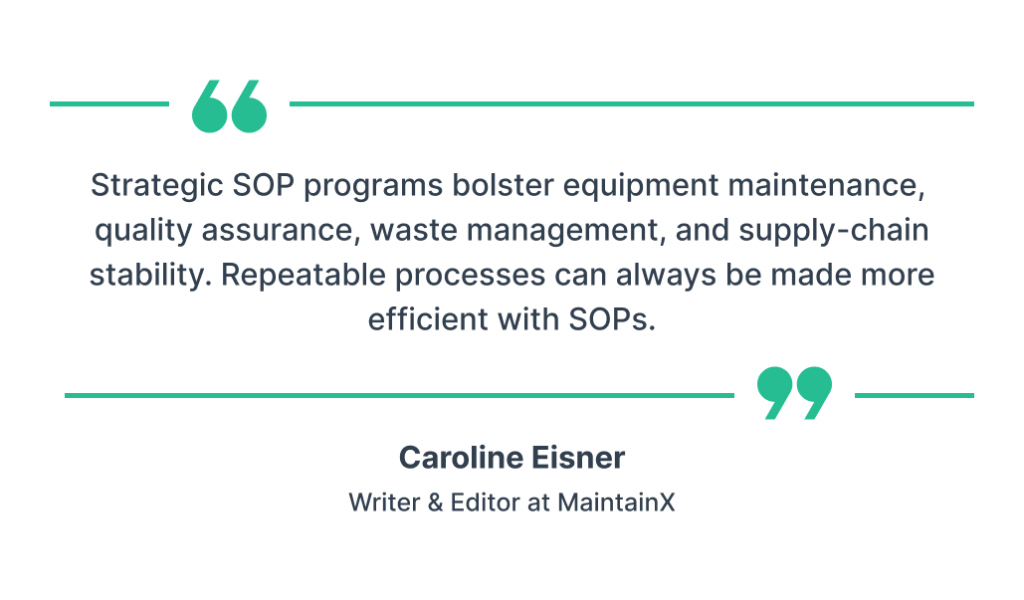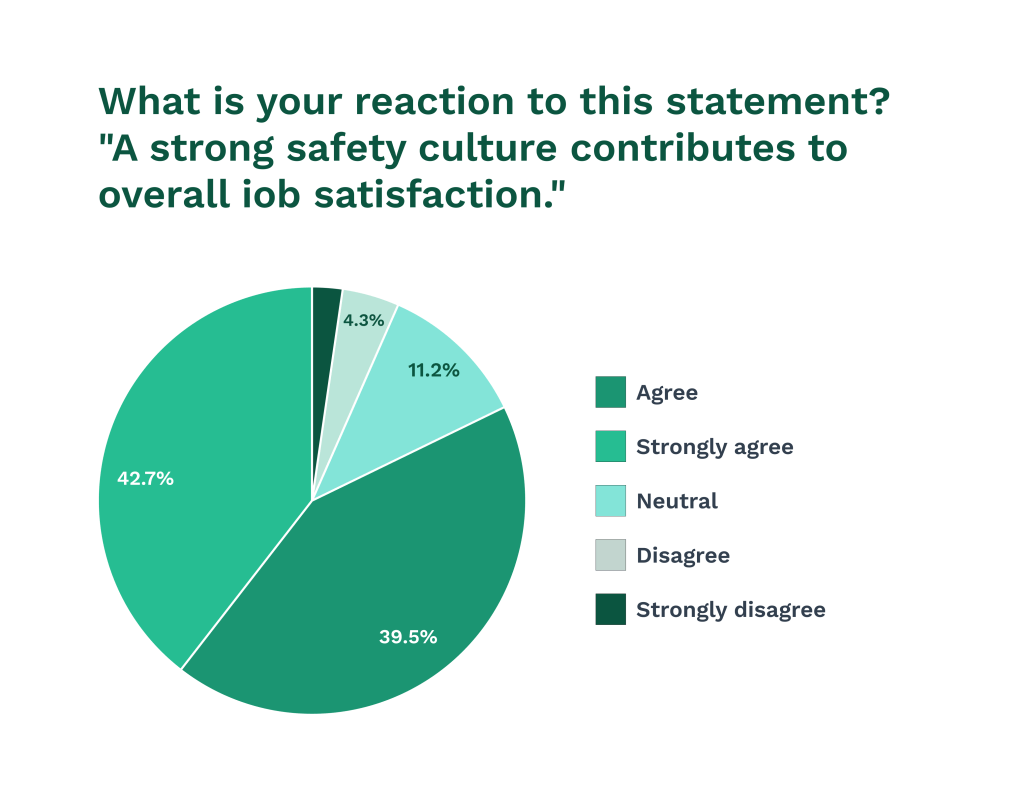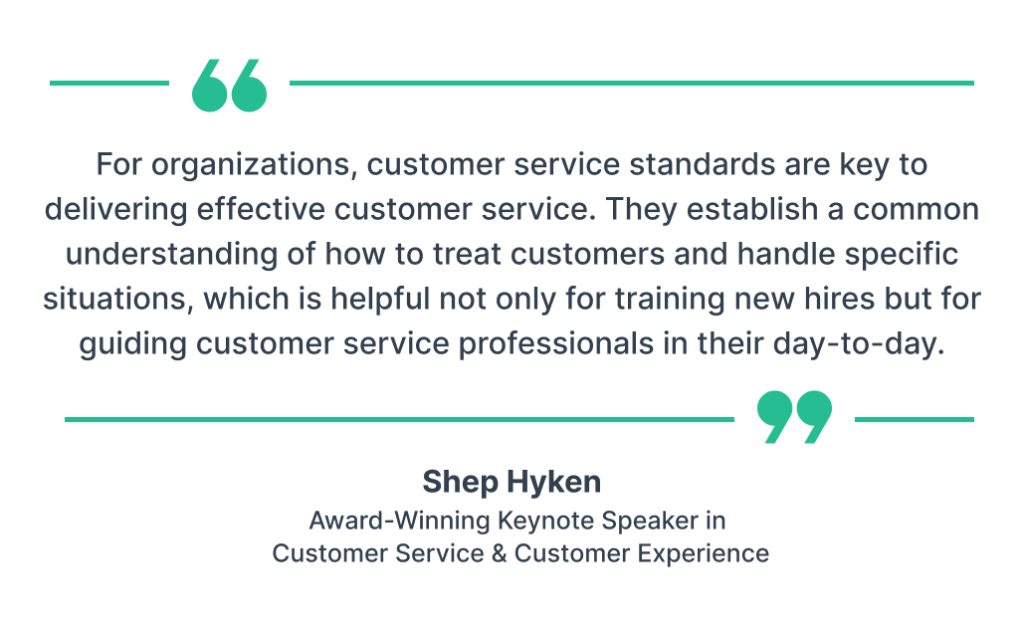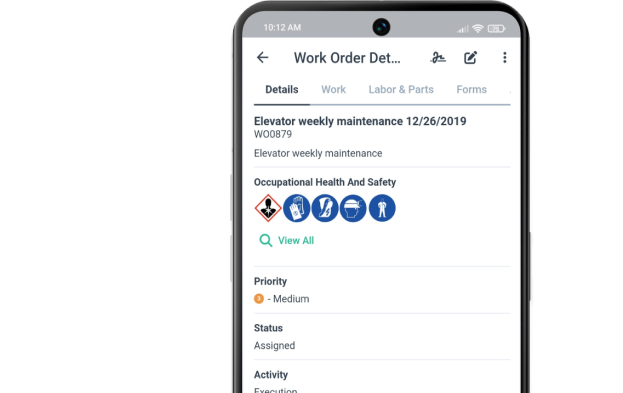Get a Free WorkTrek Demo
Let's show you how WorkTrek can help you optimize your maintenance operation.
Try for freeStandard Operating Procedures (SOPs) are key tools for businesses. They help teams work better and get more done. Many companies don’t know why SOPs matter so much.
This article covers the reasons why your organization needs a SOP.
SOPs make work easier and faster, reduce mistakes, and maintain quality. They also ensure consistency and reliability in delivering products and services, which means happy customers and a strong brand.

Illustration: WorkTrek / Data: MaintainX
Good SOPs also save money and time, simplify training new staff, and help keep important information safe when people leave. Smart leaders know SOPs are vital for growth and success.
Essential Role of SOPs in Organizational Consistency
Standard Operating Procedures (SOPs) are vital for maintaining consistency across an organization. They provide a framework for clear communication, accountability, and standardized processes.
Defining SOPs and Their Importance
SOP documentation is detailed, written instructions outlining how to perform specific organizational tasks or processes. They serve as a blueprint for consistent operations.

Source: WorkTrek
These documents ensure that all new and existing employees follow the same steps when completing tasks. This uniformity is crucial for maintaining quality and efficiency.
SOPs also act as a reference point for training new employees. SOP documents provide a clear guide for learning job responsibilities and expectations.
Building Blocks for Consistency
SOPs create a foundation for consistent performance across an organization. By providing step-by-step instructions, they eliminate guesswork and reduce errors.
By following SOPs, employees can produce reliable results regardless of who performs the task. This consistency is important in industries with strict regulatory requirements.
SOPs also help organizations:
- Maintain quality standards
- Improve efficiency
- Reduce training time
- Ensure compliance with regulations for routine tasks
Enhancing Peer Accountability
When SOPs are in place, it becomes easier for team members to hold each other accountable. Clear expectations are set for how tasks should be performed.

Illustration: WorkTrek / Data: DeskDirector
Employees can refer to SOPs when they notice deviations from standard practices. This allows for constructive feedback and improvement.
SOPs also make it easier to identify the source of errors or inefficiencies, enabling targeted training and process improvements.
By promoting accountability, SOPs contribute to a culture of continuous improvement within the organization.
Facilitating Clear Communication
SOPs serve as a common language within an organization. They provide clear, step-by-step guidelines that everyone can understand and follow.
This clarity reduces misunderstandings and improves communication between departments. Collaboration becomes smoother when everyone uses the same terminology and processes.
SOPs also make it easier to:
- Onboard new employees
- Transfer knowledge between team members
- Communicate changes in processes
SOPs help create a more cohesive and efficient work environment by standardizing communication.
Elevating Productivity with Effective SOP Implementation
Standard Operating Procedures boost productivity by streamlining processes, setting clear benchmarks, and enhancing quality management. These tools help organizations achieve consistent results and improve efficiency across all levels.
Streamlining Business Processes
Standard Operating Procedures (SOPs) act as a roadmap for employees, guiding them through tasks step-by-step. This clarity reduces confusion and minimizes errors, leading to smoother workflows.

Illustration: WorkTrek / Data: Speach
SOPs help new employees learn their roles faster. They clearly outline responsibilities and expectations, cutting down on training time and costs.
SOPs document best practices and ensure that all team members follow the most efficient methods. This consistency leads to improved productivity across the organization.

SOPs also make it easier to identify bottlenecks and inefficiencies. When processes are clearly defined, it becomes simpler to spot areas for improvement and make necessary adjustments.
Setting Benchmarks for Performance Evaluation
SOPs establish clear standards for job performance. This clarity helps both employees and managers understand what constitutes good work.
With SOPs in place, performance evaluation becomes more objective. Managers can compare an employee’s work against the documented procedures, ensuring fair and consistent assessments.
SOPs also help in setting realistic goals. By analyzing the time and resources required for each task, organizations can create achievable targets for their teams.

Illustration: WorkTrek / Data: Collato
These benchmarks foster a culture of continuous improvement. Employees can see where they stand and work towards enhancing their skills and efficiency.
Optimizing Quality Management
SOPs play a crucial role in maintaining consistent quality across products and services. They ensure that every task is performed to the same high standard, regardless of who carries it out.
By following SOPs, organizations can reduce errors and defects. This leads to fewer customer complaints and increased satisfaction.
SOPs also make it easier to comply with industry regulations and standards. They provide a clear record of processes, which is invaluable during audits or inspections.
SOPs help quickly identify the source of quality issues. This allows for faster resolution and prevents similar issues in the future.
Compliance and Legal Liability: Navigating Through SOPs
Standard Operating Procedures (SOPs) are key to meeting legal requirements and reducing legal risks. They help businesses follow industry rules and avoid costly mistakes.
Ensuring Industry Compliance
SOPs are vital tools for complying with regulations in many fields. They spell out exactly how to do tasks the right way, helping staff follow the rules without confusion.
Companies use SOPs to:
- Track changes in laws
- Train workers on new rules
- Show proof of compliance to auditors
Regular SOP reviews are a must. Laws change often, and SOPs need to change too. This keeps the business in line with current standards.
Some industries have strict rules about SOPs. For example, food companies must have clear safety steps, and tech firms need strict data privacy measures.
Mitigating Legal Risks
Well-written SOPs can protect a company from legal trouble. They show that the business follows laws and best practices.
SOPs help in several ways:
- Set clear job duties
- Create paper trails for actions taken
- Guide proper handling of sensitive info
If a legal issue arises, SOPs can prove good faith efforts. They show the company tried to do things right.
Internal audits using SOPs can catch problems early. This allows fixes before they become big legal headaches.
SOPs also help in court. They can show a company’s standard practices and safety measures.
Fostering a Culture of Safety and Quality Control
SOPs are key in creating a safer workplace, reducing accidents, and upholding quality standards. They provide clear guidelines for employees to follow, ensuring consistency and minimizing risks.
Creating a Safer Workplace
SOPs help build a safety culture by setting clear expectations for safe work practices. They outline proper procedures for handling equipment, materials, and potentially hazardous situations.
Regular SOP reviews and updates keep safety measures current with industry best practices. This proactive approach helps identify and address potential risks before accidents occur.

Illustration: WorkTrek / Data: DuraPlas
SOPs also support safety training programs. New employees can learn proper techniques quickly, while experienced workers can refresh their knowledge. This consistent training helps reduce workplace injuries and creates a more secure environment.
Preventing Accidents and Errors
Well-written SOPs safeguard against common mistakes and oversights. They provide step-by-step instructions for critical tasks, reducing the chance of human error.
SOPs are crucial for accident prevention in high-risk industries. They outline emergency procedures and safety protocols, ensuring quick and effective responses to potential dangers.
SOPs also support accident investigations. When incidents occur, comparing actual events to established procedures helps identify where breakdowns happened and how to prevent future occurrences.
Maintaining High Standards of Quality
SOPs ensure consistency in product or service quality. By following standardized processes, organizations can deliver reliable results every time.

Quality control measures are often built into SOPs. These might include checkpoints, testing procedures, or approval processes that catch defects before they reach customers.
SOPs also facilitate continuous improvement. As teams follow set procedures, they can identify inefficiencies or areas for enhancement. This feedback loop leads to refined processes and higher-quality outputs over time.
Regular SOP audits help maintain quality standards. They ensure that procedures remain relevant and effective as technology and industry standards evolve.
The Influence of SOPs on Customer and Employee Satisfaction
Standard Operating Procedures (SOPs) are key to keeping customers happy and employees engaged. They set clear expectations for service quality and job duties.
Enhancing the Customer Experience
SOPs help create a consistent customer experience across all interactions. They outline steps for handling common issues and requests, allowing staff to respond quickly and accurately.

Illustration: WorkTrek / Quote: Hyken
Well-designed SOPs ensure that every customer receives the same high level of service. They reduce errors and misunderstandings that can frustrate customers.
SOPs also enable companies to track and improve their service over time. By following set procedures, businesses can identify areas for improvement, leading to higher customer satisfaction scores.
Role of SOPs in Employee Training and Motivation
SOPs serve as valuable training tools for new hires. They provide a clear roadmap for job duties and expectations, helping employees feel confident in their roles from day one.
Clear instructions in SOPs boost productivity and reduce stress. Employees know exactly what to do in different situations. This empowers them to work independently and make decisions.

Illustration: WorkTrek / Data: Devlin Peck
SOPs also create a fair work environment. All employees follow the same rules and procedures. This reduces confusion and promotes teamwork.
Regular updates to SOPs show employees that the company values growth and improvement. This can increase motivation and job satisfaction.
Knowledge Management: SOPs as Tools for Institutional Memory
Standard Operating Procedures (SOPs) can help preserve and share organizational knowledge. They capture important information and make it accessible to all employees.
Curtailing Tribal Knowledge
Tribal knowledge refers to information known only by a select few in an organization. When key employees leave, this can be risky for companies. SOPs help capture institutional memory and spread it throughout the organization.
By documenting processes in SOPs, companies can:
- Reduce dependence on individual employees
- Ensure consistency in operations
- Preserve critical know-how
A standard operating procedure checklist can help new employees learn tasks quickly and help current staff remember necessary steps in complex processes.
Facilitating Cross-Training and Knowledge Transfer
SOPs are valuable tools for cross-training employees. They provide a clear guide for teaching and learning new organizational skills.
Benefits of using SOPs for knowledge transfer include:
- Faster onboarding of new employees
- Easier skill development for existing staff
- Improved backup coverage for key roles
When employees leave, SOPs ensure their knowledge isn’t lost. New team members can quickly get up to speed by following documented procedures.
SOPs also make it easier to update and improve processes over time. As staff members gain experience, they can suggest updates to keep procedures current and effective.










